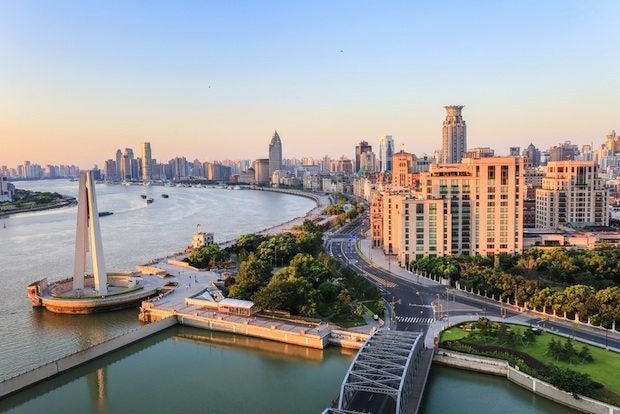
Once a top locale for luxury retailers, Shanghai's Bund has become second-best. (Shutterstock)
Despite being known for serving as the home to many global high-end boutiques, the Shanghai Bund’s glamour has been fading quickly as brands are leaving the scene one after another. Although it remains as the city’s most-visited tourist attraction, the district has been failing to provide a favorable environment for high-end retailers in recent years. A Dongfang Daily report published on April 3 explored the numerous reasons behind the luxury brands exodus from the Bund, including inconvenient parking, exorbitant rent, and declining sales.
The earliest brand to exit was Hugo Boss, which left in 2009 and recently relocated to the Jing An Kerry Centre, becoming a neighbor of Burberry. Dolce & Gabbana closed its boutique at the Bund’s No. 6 address, and was followed by Boucheron’s closing at No. 18. In early 2013, Giorgio Armani closed its 1,100 square-meter flagship store of 10 years located at No. 3.
One of the main reasons brands are embarking en masse is simply the high rent cost of the area. Many brands that decided to break up with the Bund did not relocate very far: Shiatzy Chen moved to the Peninsula Hotel, which is a mere 100 meters away, and Patek Philippe moved 500 meters away to the Rockbund for a reportedly 30 percent lower rent price in April 2013. According to the Dongfang Daily report, rent at the Bund is now up to at least 50 yuan (US$8) per square meter per day—not too far from the rent in the Nanjing West Road and Huaihai Road, Shanghai’s premier shopping streets, where a first-floor rent price can be as high as 110 yuan (US$17) per square meter per day.
According to the report, the district’s free-standing building structures are to blame for the high rent. Each member of the illustrious building clusters in the Bund is an historic single-detached building. While this originally meant luxury brands were scrambling to snap up the prime real estate, additional factors such as a lack of organization are now causing them to believe it’s not worth the high prices to stay.
According to the report, behind every building in the Bund is a separate state-owned enterprise that rents its property to independent developers. Since there is no unified management in charge, the shopping route of a consumer can be often interrupted by office buildings, foreign agencies, and customs headquarters. According to the article:
"Building owners have always been actively working on attracting retailers, but there has been a lack of systemized management, and they have no control over the neighboring buildings," said Wang Mingshu from Knight Frank China, a real estate consulting firm. Since the initial stages of the development, all buildings in the Bund were developed separately as the development teams and companies worked individually. In other words, the lack of communication between buildings, different business positioning, and the absence of resource sharing such as parking spaces were the primary reasons keeping the Bund from being successfully transformed into a Western-style shopping district. Unlike the coherence that Fifth Avenue and Oxford Street have, the Bund lacks development as a whole.
The lack of organization also means that malls dedicated specifically to luxury retail are able to provide better opportunities for brands to offer better services to customers. The report states:
Prada has opened two bigger stores at iapm and the Jing An Kerry Centre for better shopping experience, sufficient stock space, and better VIP services. Those are the reasons Burberry and Hugo Boss opened bigger stores at the Jing An Kerry Centre, despite their success at typical department stores.
The report predicts that another 18 luxury retailers are unlikely to renew their leases when the time comes to do so. Since the Bund's high rent prices had originally meant that luxury retailers were some of the main businesses who could afford to locate there, building owners are likely scrambling to find new residents.